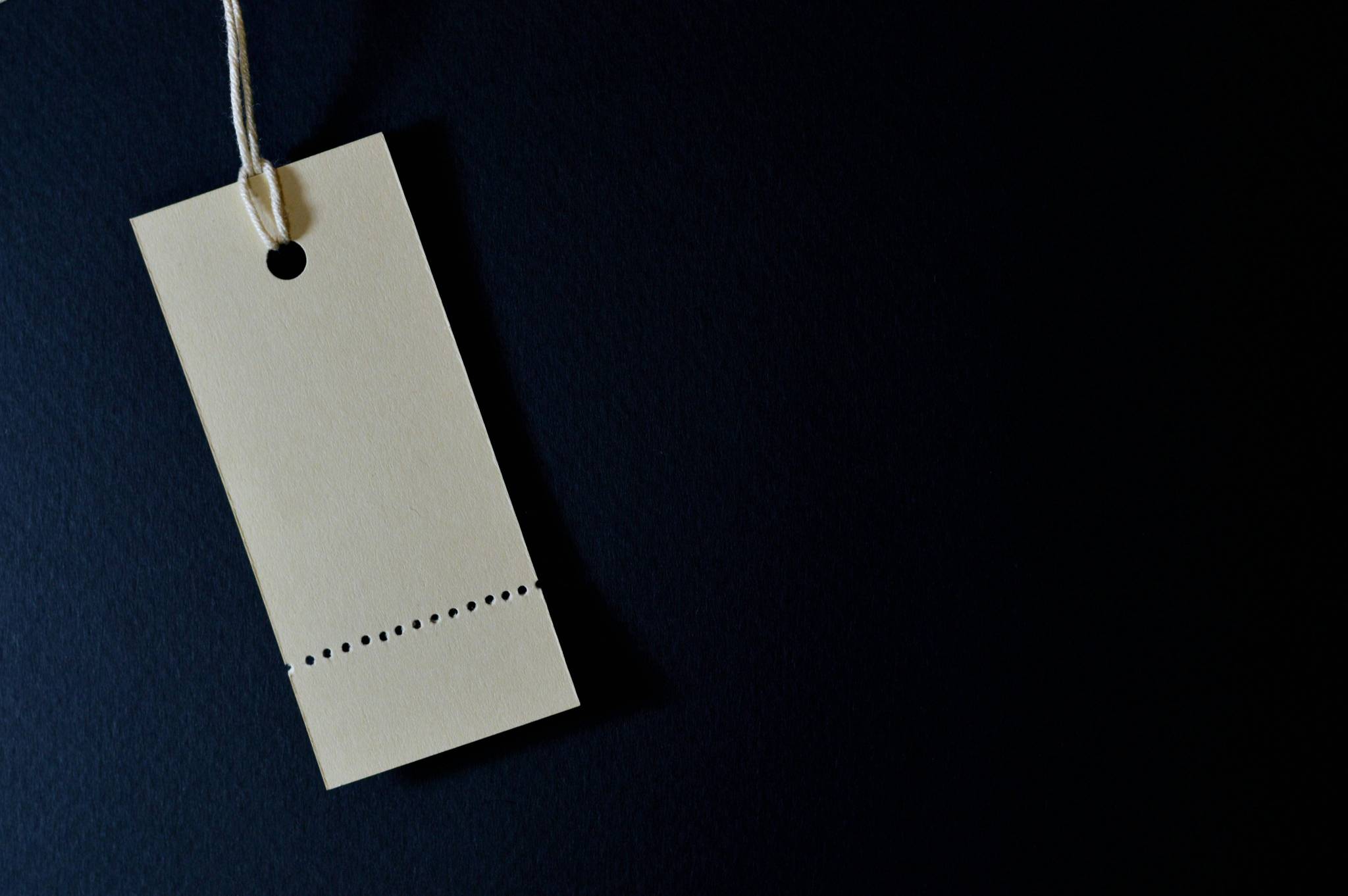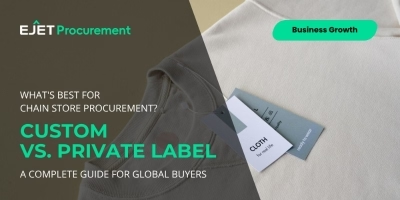The fast-developing retail industry demands that chain stores continuously explore fresh strategies that enable them to manage expenses through optimizing their supply chain procedures to stand out.
About product sourcing, one of the most significant problems businesses face is whether to opt for custom products or private-label goods. The selection between custom or private label products depends mainly on marketplace needs, product design autonomy and strategic planning direction.
In this guide, we'll explore the differences between custom and private label products and how each option plays a significant role in chain store procurement. By the end of this blog, we believe you can better understand what suits your business needs best, helping you make more informed decisions in your product procurement strategy.
Understanding Private Label and Custom Products
What is Private Labeling?
Private labeling refers to a business practice where a retailer sells products manufactured by a third party under their own brand name. Standardized products available from multiple markets function under various brand names. Private labeling means retailers sell goods which manufactured to their specifications but are marketed under their unique brand.
Retailers who go for private-label products generally have less control over the design and manufacturing process: Company control of product quality remains limited to vendor selection with price negotiations, even though these activities allow quality influence.
The benefits of private labeling often include lower production costs, quicker market entry, and the ability to establish a unique brand identity without needing to develop a product from scratch.
What is Custom Product Sourcing?
Custom product sourcing, on the other hand, involves designing and producing products tailored to a retailer’s specific requirements. A retailer engages manufacturers for custom product creation when they want exclusive designs, specifications, or materials that will lead to original products.
The customization process gives retailers complete control over the product's design, materials, packaging, and more. Such a process demands advanced expertise in manufacturing alongside product development skills and logistical capabilities.
Companies that opt for custom sourcing are typically involved in every aspect of product creation, from design to sourcing raw materials to production; they look for high differentiation, premium pricing strategies, and a unique selling proposition (USP).

Private Label vs. Custom: 5 Key Differences
Control Over Product Design
One of the most significant differences between private label and custom products is the level of control a business has over the product design.
With private labeling, the retailer's involvement is generally limited to branding and marketing, and the manufacturer controls their product's standard.
Retailers can choose from a range of pre-existing products and customize packaging, logos, and labels to match their brand's identity.
In contrast, custom product sourcing allows retailers to work closely with manufacturers to create a product from scratch. They gain complete control of selecting both the product design, including its materials, its operational features, and its packaging structure.
Retailers who opt for custom products can be more innovative and differentiate themselves in a crowded market. This level of product customization is particularly beneficial for brands looking to introduce unique products or create a strong brand identity.
Cost Considerations
When it comes to product procurement, cost is a major factor in decision-making.
Private labeling tends to be more affordable for retailers because the manufacturer is already set up to produce the product at scale. A standardized product design creates lower manufacturing expenses thanks to fewer associated manufacturing costs.
Meanwhile, the buying of products in large quantities allows retailers to minimize production expenses, which makes it an excellent solution for businesses that need to rapidly expand their product range at a minimal upfront cost.
On the other hand, custom products generally come with higher production costs. Retailers take part in complete product management activities starting with designing products and continuing through sourcing materials and controlling manufacturing stages.
Custom product sourcing may require a more substantial initial investment, especially for smaller runs, as the retailer must pay for design work, prototypes, and development. Additionally, producing custom products can take longer than sourcing private-label goods, which can delay time-to-market.
Brand Differentiation
Chain stores need branded items as a primary competitive strategy to position themselves against competitors in the market.
This is where custom products shine. Retailers who choose custom sourcing can create products that perfectly align with their brand's identity, offering customers something unique that they can't find anywhere else.
Retailers can strategically customize product design, functional features, and pricing structures to establish innovation and achieve higher profit margins. Whenever consumers purchase exclusive products, they quickly develop an intention to spend extra money on those products.
In contrast, private-label products tend to offer less room for differentiation. The majority of retail outlets use identical manufacturer sources to acquire comparable products, so product uniqueness differs from branding and marketing efforts.
Although private labeling can still lead to brand loyalty, it may not be as effective at setting a brand apart from competitors in a saturated market.
_1745893961210.jpg)
Time to Market
In the retail industry, chain operators need to work at maximum speed.
Private labeling is the more efficient option for retailers who want to bring products to market quickly. Since the product has already been developed, the only step involved is placing an order and customizing the branding.
With a pre-existing supply chain, private-label products can typically be manufactured and shipped relatively quickly, enabling businesses to react swiftly to market trends and customer demand.
Custom products can take longer to develop. The product needs added time during its design phase alongside prototype development and approval procedures in order to become available for large-scale production.
For retailers who have a well-established supply chain and production partner, custom products are better choices.
Scalability
Scalability is another important consideration in product procurement.
Due to their standardized nature, Private-label products are generally easier to scale. The existing manufacturing facilities enable manufacturers to produce goods in bulk, which provides retailers with straightforward possibilities to adjust their orders according to increasing market requirements.
Retailers who want new product lines without spending heavily to manufacture new products should choose private-label products.
Custom products, on the other hand, may face scalability challenges. The bespoke nature of custom sourcing means that production is often more complex and time-consuming.
When demand surprises retailers, they frequently need to find additional suppliers and boost production potential to meet consumer needs. However, businesses that successfully scale custom product sourcing can enjoy exclusive, high-margin products that are unique to their brand.
Why Choose a Sourcing Agent for Procurement?
Whether you are considering private label or custom sourcing, working with a sourcing agent can significantly streamline the product procurement process.
Businesses gain efficient supply chain management, price negotiation, and quality control monitoring through partnering with a professional sourcing agent.
-
Find Suppliers: A good sourcing agent can identify manufacturers that specialize in private-label products or those that offer custom design capabilities.
-
Digital Procurement: Their market intelligence helps suppliers to deliver procurement decisions that satisfy your strategic directions as well as your financial boundaries.
-
Product Sourcing: By leveraging the expertise of a sourcing agent, retailers can ensure that they are getting the best value for their money, whether they are sourcing private labels or custom products.
-
Fulfillment & Shipping: A sourcing agent can also help you navigate the complexities of international procurement, including customs clearance, shipping, and compliance with international standards.
Conclusion
The decision between private label and custom products ultimately depends on your chain store’s business goals, budget, and long-term vision.
If you’re looking for quick market entry, cost-effective options, and scalability, private labeling may be the best choice. However, if differentiation, exclusivity, and brand identity are your top priorities, custom product sourcing will offer you the flexibility and uniqueness you need.
By working with a trusted sourcing agent, chain stores can optimize their product procurement process, ensuring they find the best manufacturers and suppliers for both private label and custom products.
If you need any help, please contact EJET Procurement as soon as possible. Our procurement experts will provide you with round-the-clock service.
FAQs
1. How can a sourcing agent help optimize my procurement process when dealing with both private label and custom products?
A sourcing agent plays a pivotal role in streamlining the procurement process for private label and custom products. They assist with supplier identification while delivering market analysis to identify suitable suppliers that match business quality demands, delivery requirements, and price guidelines.
For private labeling, they can find suppliers with proven track records of producing standardized goods and assist in customizing packaging and branding.
When sourcing custom products, a sourcing agent ensures that the design and manufacturing process align with your exact specifications, managing everything from prototype development to final delivery.
The sourcing agent utilizes their network together with industry knowledge to lower business risks and maintain product quality, making companies can dedicate energy toward expansion.
2. Is it more cost-effective to start with private-label products, or should chain stores focus on custom products from the beginning?
Starting with private-label products can often be more cost-effective, especially for businesses with limited resources or those looking to enter the market quickly. Private labeling allows retailers to take advantage of an established manufacturing process, which reduces upfront costs and risks. Businesses achieve a protected product expansion through private labeling because they can save money on development costs and reach the market faster, which leads to economically sound portfolio development.
However, if long-term brand differentiation and exclusivity are key business goals, investing in custom products early on may provide a higher return in the future. Your business strategy will determine whether a private label or custom products better suit your needs based on operation size and market target, and brand identity requirements.
3. How do the challenges of scalability differ between private label and custom products in the procurement process?
Private-label products typically offer greater scalability due to their standardized nature and existing production processes. The production capabilities of manufacturers become flexible when they manufacture for large quantities so businesses can expand their orders by increasing demand without disrupting the supply chain operation.
In contrast, scaling custom products can be more challenging. As custom items involve unique designs and specifications, increasing order volumes may require additional production planning, raw material sourcing, and adjustments to the manufacturing process. The complexity of products may create points of failure that appear during an attempted increase in production levels. Therefore, businesses looking to scale custom products must ensure their supply chain and manufacturing partners are equipped to handle increased demand and maintain product consistency.
All images sourced from: Pexels


_1745893980554.jpg)
